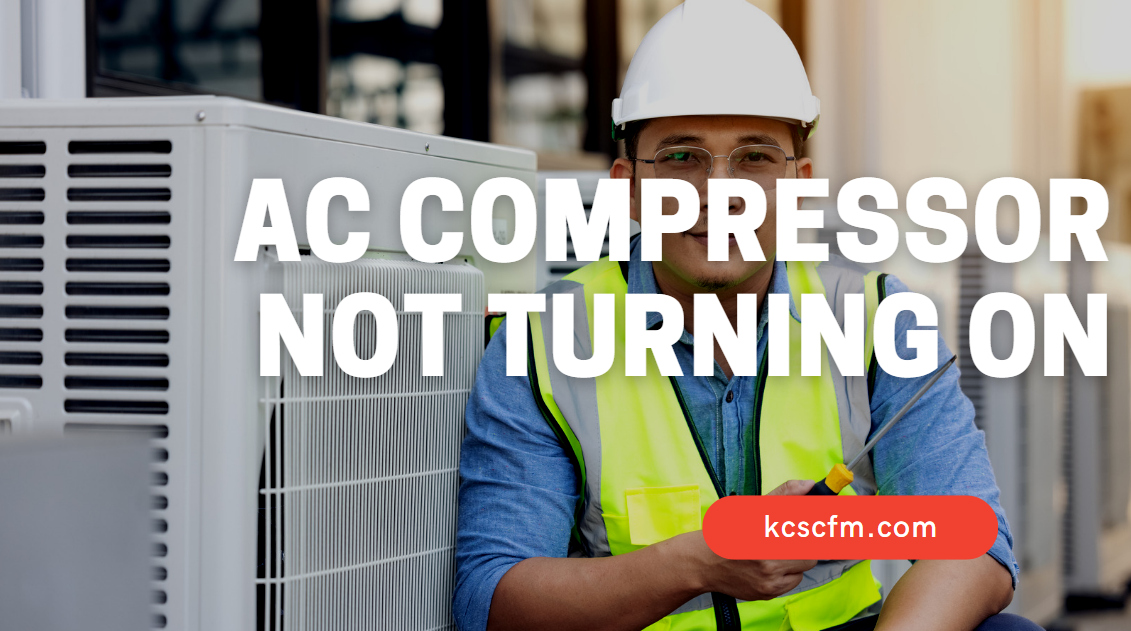The air conditioning compressor is probably one of the most important parts of your air conditioning unit. In the absence of a working compressor, your air conditioner cannot circulate cool air inside your home or office or car. Read on to find out what you can do in case your AC compressor not turning on.
The compressor controls the refrigerant flow, which in turn maintains proper air pressure in the system and keeps the refrigerant circulating. When the A/C compressor does not work, therefore, the air conditioning stops working, causing you discomfort.
AC Compressor Not Turning ON – Troubleshoot And Diagnosis

An HVAC (Heating, Ventilation and Air Conditioning) compressor is a device that helps to regulate the temperature within a room. It works by removing heat from an area and transferring it outside the home, which can help to keep residents warm in winter. An HVAC system consists of many parts, some of which should be replaced regularly.
ACs should be regularly inspected and maintained to ensure the unit will last as long and work as efficiently as possible. If your AC is malfunctioning, it’s probably due to a problem with the compressor.
Air conditioners use powerful compressors to deliver cool indoor air, but if the compressor stops working — whether it’s due to a power outage or a mechanical malfunction — then your system will be useless. Luckily, there are some common issues that can cause cooling problems; below, we’ve outlined solutions for some of the most common errors.
1. Check Power Supply
The first thing to do when your AC won’t turn on is to check if it’s receiving power. If fuses have blown or breakers are tripped, refer to a professional electrician who can help you figure out the problem. No fuse or breaker should blow or trip frequently — both cause damage to the compressor and other parts of the AC unit, affecting its performance in severe cases.
To fix this, the first thing you should do is inspect the breaker that powers your AC unit. This should be in your main electrical panel. If the breaker is flipped, flip it back and turn the AC back on.
Your air conditioning system should always be in optimal working order. Problems with fuses and breakers can be a sign of serious issues that need to be addressed quickly, from a loose connection to more serious problems with the compressor or refrigerant. Hiring an experienced HVAC professional can help you keep your system functioning safely and efficiently.
2. Dirty Coil And Filters
Obstructions and impurities in your air filters, such as dirt, dust and pet hair, can significantly reduce airflow, which eventually causes your equipment to fail.
Air conditioner coils are exceptionally sensitive to debris and impurities. These materials get caught up in coils and dirty grills, making the indoor unit heat up significantly faster.
Clogged air filters, evaporator coils and condenser fins are a few of the many problems that can arise with AC unit. When parts of the refrigerator cannot circulate air properly, the unit will shut down or overheat.
When an AC unit runs this hot, things start to break down and the unit will stop working altogether if they go unchecked.
Your AC compressor may get damaged if you don’t maintain it. In fact, without regular service, your AC can shut down every time there is a power surge or an electrical disturbance. When this happens, it’s usually easier and cheaper just to replace the compressor than to repair it.
To prevent this from happening, clean the condenser coils, wash and dry air filters regularly, and remove any blockages that might be clogging vents for airflow into your home or business’s HVAC system.
3. Faulty Capacitors
Of all the AC compressor problems there are, faulty capacitors are most often the cause. A capacitor may short out or overheat — either issue will stop an AC unit from functioning. If this happens, your technician may swap it for a hard-start capacitor. This little component is used to give your system a kick start and should get things going again with no problems at all.
When AC compressors won’t turn on, replacing the capacitor and testing the unit is a common way to troubleshoot it. This is good because it clearly identifies any issue with the compressor and fixes it as needed. It also helps to prevent future issues due to faulty components.
4. Defective Start Relays
When an air conditioning system won’t turn on, it can be a real pain. If you’re in a hurry to get your unit working again, trying replacing the start capacitor. The problem will likely resolve itself quickly and easily — but if it doesn’t, simply restart the cooling cycle by turning off the power for a moment or two and try again.
5. Check The Valves
Refrigerant is moved through the AC system by a series of solenoid valves. If one of these valves breaks, refrigerant cannot be efficiently changed into a gas, which means it will stop before reaching the compressor.
As this problem is often only related to a bad valve, it’s easy to fix by replacing that broken part.
Replacing a faulty valve will resolve most issues with a malfunctioning air conditioner compressor. In fact, even when the refrigerant that’s supposed to cool your home is liquid instead of gas, replacing the defective component can often get your unit back to normal.
6. Refrigerant Leak
No one wants to be hot while they’re at home on a cool summer night. Air conditioners and compressors work together to reduce indoor heat and keep your house cool, but if you find that your air conditioner isn’t quite cooling like it used to, don’t worry — it might just need your attention. Your compressor must have the refrigerant levels checked regularly.
When too much refrigerant has been used or leaks out of the system, the air conditioner won’t produce cold air. A trained technician will come check the air conditioner and recharge it with the necessary amount of refrigerant, so you can enjoy your optimal temperature once again.
7. Faulty Compressor
If your air conditioner’s compressor is determined to be totally broken, you have two options. If re-gassing costs less than half of the total cost of a new AC, then it will probably be best to replace the compressor instead of buying an entirely new unit.
But if the cost of replacing the compressor is greater than 50 percent of a whole new AC, it will probably be more practical just to buy a whole new AC.
Final Thoughts
With a little maintenance, your AC will work better and longer. Regular inspections of the unit’s parts can also detect small problems before they escalate into major issues. It is also important that you change filters regularly as this helps maintain the appliance’s performance and improves air quality inside your home or office.
When your home faces problems with the HVAC unit, you may feel much more than just a bit of concern — and if you don’t go to it immediately this could be just the beginning of a gnawing sense of discomfort. The best option is to call an expert; they know how to troubleshoot and notice signs that might indicate larger issues.

Hi there! I’m Sam Hendricks, and I’m a repair technician and expert. I created this website to help people like you save money and time by fixing your own appliances.
Over the years, I’ve seen people spend a lot of money on unnecessary repairs or replacements. That’s why I decided to share my expertise and create easy-to-follow guides for fixing appliances on your own.
